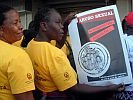The Good Girls and the Feminists
Opinion
by Maria José Arthur
At the time when I was still a teenager, one of the great virtues of women was not to be talked about. Like a kind of magic wand, the less a woman was talked about, the greater her fame as a “good girl”. There was nothing worse than having your name “on everyone’s lips”. The description, “one who does little of note”, was fundamental. That is why now, looking back on the path I have taken and thinking about my present commitments, I want to laugh, because nothing could be more different from the strategies that we follow, as feminists and activists for women’s human rights. We think the time has come to expose the discrimination experienced by the majority of women and make it more visible, as a way of raising public awareness and making decision-makers realise there is need for change. At the same time, we want to use this exposure to justify our demands for equality and justice.
In fact, if we just look around us, women in Mozambique have undeniably gained in visibility, although this does not mean that there is any broad agreement on what it is to be a woman or that the implicit representation of womanhood is the same. And despite the great “advances” that are so widely proclaimed, there are still certain images of women in the public domain that have negative connotations and serve as a model – inversely – for sustaining the authoritative version of womanhood, which sees women as not having the capacity to manage their own lives and suffering from chronic insecurity, and which cherishes motherhood. As Michelle Perrot (1997) has pointed out, the expression “public woman”, which is used for the presence of women in places considered male preserves, has a disqualifying value, linked to prostitution and unbecoming conduct (in contrast, the “public man” is one who devotes his intelligence and efforts to the good of the majority)1. It is this last aspect that also makes the public woman potentially dangerous, because she evades rules and control, and she has neither faith nor master.
All women’s rights activists know what I am talking about, of the care that must be taken to find the right measure so that a given message is listened to and accepted, without reaching the mark beyond which everything is immediately ignored because the messenger herself is disqualified. Being so, it might be said of such a person that she is “radical”, for example, that she “is right but fails in her methods”, “she wants everything at once without seeing the need to go in stages”, or worst of all, that she is a “feminist”.
This pressure of public opinion has direct repercussions on being a women’s rights activist. It is as though people constantly need to justify themselves: “I defend this or that, but be careful, I’m not a feminist”. Indeed, many proposals for action tend towards self-control, because of the old fear of “being on everyone’s lips”, and not for being frivolous or badly behaved, but for being feminists, which is almost the same thing.
This situation is not unknown in history, in the struggles of the excluded groups of this world for their rights. In the case of the battles for equal rights between men and women, we should remember that we are confronting a patriarchal system that has survived for thousands of years and has coexisted with various other economic and political systems. Today, at the beginning of the 21st Century, when the grossest positions have been taken in support of male domination, making them retrograde and unacceptable, other means will be sought to ensure that this same patriarchal order endures and is maintained. One such is the demonisation of the women’s political movement that seeks equality, “feminism”, which is presented as the obverse of “machismo”. Thus, feminist projects and demands are seen as an attempt to install female supremacy at the cost of male subordination. For this reason, every troublesome initiative or voice is immediately labelled feminist. No explanations or arguments have any effect. There is no point in trying to have a debate on the proposals or ideas in question, since they are already disqualified as feminist. There is even something irrational about this refusal.
Another connotation that lumps everything that is bad into feminism is when it said that the movement is “foreign”. As such, it constitutes a direct attack on the culture of Africans.
Just as the struggles of the excluded groups are adapted to the strategies of domination of the stronger groups, the latter are constantly developing manoeuvres to neutralise their opponents. For this reason, the time has come for us to fight for the right to defend and express our ideas on equality, without anyone telling us where our limits are; without anyone giving a double meaning to ideas and proposals that defend no more than equality, justice and the same opportunities for men and women. Equality is either complete or it is not equality. One must be radical to demand equality with consistency (radical in the sense of going to the root, the origin) in order not to negate the very essence of the demands. For this reason, the dilemma of being a good girl or a feminist is no dilemma at all, in the sense that it is not possible to be an effective activist for women’s human rights without incurring disgrace, without drawing hostile reactions that may be in the form of taunts and insults, both aimed at exclusion.
Elza Soares said in one song that it is hard to bear Adam’s rib. I would add that it will be harder still to wrench it out.
Footnote:
- M. Perrot, 1997, Femmes publiques, Paris, ed. Textuel.







 Information in English
Information in English



















